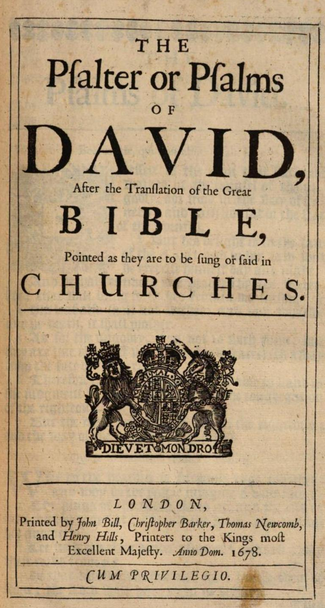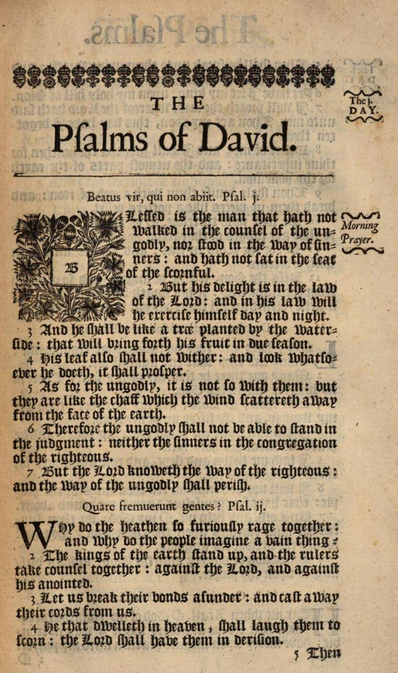Read the Psalms monthly in 2024
 For your consideration during New Year's Resolution Season:
For your consideration during New Year's Resolution Season:
A little over a year ago, I decided I needed to do a better job of feeding my mind and spirit. I notice that my bedtime habit of listening to old British radio comedies (particularly Hancock's Half Hour) to help me drift off to sleep had committed many of the lines and scenes to my memory, without even trying. I thought I ought to seek some more edifying material to listen to often enough that it embeds itself in my memory.
The Psalms are the only divinely inspired hymnal. They cover the gamut of emotion and sentiment in the believer's life, teaching us to set our hopes and affections on God in every circumstance. They challenge us to strive for holiness and express our constant need for forgiveness and mercy. They express awe at God's wondrous works in the past and hopes for his just judgement and deliverance in the future.
Over the last year or so, I have been listening to a series of 60 YouTube videos of someone reciting the complete Book of Psalms -- all 150 -- in daily morning and evening portions for each day of the month, in accordance with the Church of England's Book of Common Prayer.
Psalm-chanting was a common monastic practice, but Thomas Cranmer and the leaders of the English Reformation believed that the people should read or sing the psalms in their own tongue. Starting with the very first Book of Common Prayer (1549), a schedule was set out for reciting the entire Psalter every month as part of the daily office -- the daily services of morning prayer (matins) and evening prayer (evensong). The daily office was another transfer by the Reformers of a monastic practice in Latin (the canonical hours) to lay worship in the vernacular. The Book of Common Prayer also included a schedule for reading through almost the entire Bible over the course of the year. These were retained and refined in subsequent editions, leading to the official 1662 Book of Common Prayer, which is still the official prayer book of the Church of England.
 The 60 Psalter portions are intended to be roughly equal in length. Some portions consist of a single lengthy psalm (e.g., Psalm 37), and some contain as many as 6 short psalms (e.g., Psalms 120-125). The longest psalm and longest chapter in the Bible, the great acrostic Psalm 119, is divided across five services, reading 4 to 5 of the 22 8-verse stanzas at each service.
The 60 Psalter portions are intended to be roughly equal in length. Some portions consist of a single lengthy psalm (e.g., Psalm 37), and some contain as many as 6 short psalms (e.g., Psalms 120-125). The longest psalm and longest chapter in the Bible, the great acrostic Psalm 119, is divided across five services, reading 4 to 5 of the 22 8-verse stanzas at each service.
The Psalter used in the BCP is Myles Coverdale's translation, as contained in the Great Bible, the first English translation authorized for use in the Church of England. Although this translation was supplanted by the Bishop's Bible in 1568, which was supplanted by King James I's Authorized Version in 1611, the C of E retained for use in worship the translation of the Psalter which was already familiar to two generations of priests and parishioners.
I chose the BCP version, rather than a modern translation, because I thought the less-quotidian diction and vocabulary would stick better in my memory and because some of the language was already familiar to me from years of singing choral anthems with texts drawn from the Coverdale Psalter. Of this translation, C. S. Lewis wrote, "Even of the old translators he is by no means the most accurate; and of course a sound modern scholar has more Hebrew in his little finger than poor Coverdale had in his whole body. But in beauty, in poetry, he, and St. Jerome, the great Latin translator, are beyond all whom I know."
I found two sources for listening to the Coverdale Psalter, both projects apparently undertaken during Britain's pandemic lockdowns. Paul Edmondson has recorded the 150 Psalms as individual files on SoundCloud. He reads well, steadily at a conversational pace, without pauses. He has also done readings of Ecclesiastes, John's Gospel, Dickens' A Christmas Carol, and passages from Shakespeare.
On YouTube, I found a channel called Cambridge House of Prayer (CAMHOP), which has produced 60 videos of the Coverdale Psalter, each containing a single morning or evening prayer service's portion of the Psalms. The channel's self-description states:
Cambridge House of Prayer is a prayer and worship community of people of all ages and backgrounds that passionately pursues the presence of our God: Father, Son & Spirit.On this channel you can join us in Morning Prayer (Wednesday 8am), Compline (Friday 9pm) as well as other expressions of prayer and worship throughout the week.
'He brought me out into a spacious place, he rescued me because he delighted in me.'
Psalm 18:19
There are links to a website (camhop.uk) that is online, but also to social media profiles that are no longer active. In addition to the Psalter readings, the YouTube channel also has recordings of morning and evening prayer services and readings from the Gospels, accompanied by singer and harpist Lucy Bunce. The last update to the YouTube channel was in May 2021. There's more information about CAMHOP here.
The CAMHOP Coverdale Psalter videos are narrated by Alistair Rouse. He reads slowly, with pauses after each phrase, ideal for someone to listen and repeat after. Videos typically run about 8 minutes. The visual consists of title graphics and static images from old psalm books, so there's nothing you need to watch. The official CAMHOP playlist has a few of the portions out of order, so I built my own, which is available publicly.
I first came across the CAMHOP Coverdale Psalter videos and began using them in 2022. I listen and repeat after the reader as I go for a walk or as I drive around town. I try to listen to both morning and evening portions every day. If I miss a day, I may try to catch up. If I miss a few, I simply resume with the current portion. By now, I would estimate I've listened and recited every psalm at least a dozen times, even taking missed days into account. I've tried to stretch from repeating after every phrase to waiting for the verse to complete, which helps to tie the phrases together in my memory and presents a more cohesive thought to my mind.
For perspective on how to read and understand the Psalms, I recommend C. S. Lewis's book Reflections on the Psalms. (Audiobook here.) Lewis writes as a reader, not an expert:
In this book, then, I write as one amateur to another, talking about difficulties I have met, or lights I have gained, when reading the Psalms, with the hope that this might at any rate interest, and sometimes even help, other inexpert readers. I am "comparing notes'', not presuming to instruct. It may appear to some that I have used the Psalms merely as pegs on which to hang a series of miscellaneous essays. I do not know that it would have done any harm if I had written the book that way, and I shall have no grievance against anyone who reads it that way. But that is not how it was in fact written. The thoughts it contains are those to which I found myself driven in reading the Psalms; sometimes by my enjoyment of them, sometimes by meeting with what at first I could not enjoy....What must be said, however, is that the Psalms are poems, and poems intended to be sung: not doctrinal treatises, nor even sermons. Those who talk of reading the Bible "'as literature" sometimes mean, I think, reading it without attending to the main thing it is about; like reading Burke with no interest in politics, or reading the Aeneid with no interest in Rome. That seems to me to be nonsense. But there is a saner sense in which the Bible, since it is after all literature, cannot properly be read except as literature; and the different parts of it as the different sorts of literature they are. Most emphatically the Psalms must be read as poems; as lyrics, with all the licences and all the formalities, the hyperboles, the emotional rather than logical connections, which are proper to lyric poetry. They must be read as poems if they are to be understood ; no less than French must be read as French or English as English. Otherwise we shall miss what is in them and think we see what is not.
I have an app on my Android phone called BraveNewPipe, an open-source browser front end optimized for streaming videos and audio. It works with a variety of platforms, including YouTube, Bitchute, Rumble, and Soundcloud. It allows for the creation of playlists local to your phone, and it allows videos to play even when the phone screen is locked. It works very well for listening when my hands need to be free, as when I'm out for a walk, and I also use it for listening to podcasts while driving and while doing yardwork and chores around the house.
For the new year, I'm considering adding to my daily Psalter recitation a way to read the Gospels through every month. There are 89 chapters among the four books, which divides nicely into three chapters per day.
0 TrackBacks
Listed below are links to blogs that reference this entry: Read the Psalms monthly in 2024.
TrackBack URL for this entry: https://www.batesline.com/cgi-bin/mt/mt-tb.cgi/9137